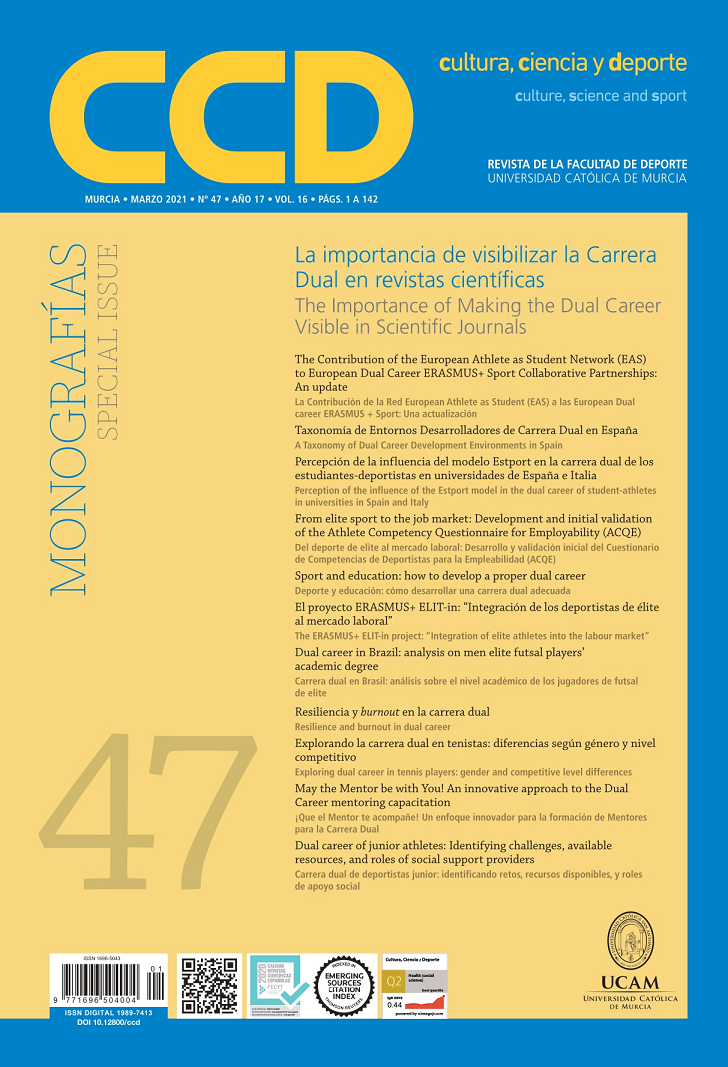El proyecto ERASMUS+ ELIT-in: “Integración de los deportistas de élite al mercado laboral” (The ERASMUS+ ELIT-in project: “Integration of elite athletes into the labour market”)
DOI:
https://doi.org/10.12800/ccd.v16i47.1695Palabras clave:
Habilidades blandas, educación no formal, alto rendimiento, deporte, transición (Soft skills, non-formal education, high performance, sport, transition)Resumen
El proyecto ELIT-in nace con el objetivo de promover y apoyar el desarrollo de competencias transversales en los deportistas de élite para prepararlos al ámbito laboral al que se enfrentarán una vez terminada su carrera deportiva. Con base en el método Delphi se identificaron 110 habilidades blandas, las cuales fueron revisadas
por un grupo de expertos, quienes determinaron siete competencias transversales que pueden ser transferidas al mercado laboral y que son reconocidas por los empresarios como relevantes. Dichas competencias son: Comunicación, Habilidades de emprendimiento, Ética en el trabajo, Habilidades en la resolución de conflictos, Habilidades de negociación, Trabajo en equipo y Gestión del tiempo. Para ello, se ha creado un Programa de Formación e-Learning llamado “ELIT-in A road to the future” (https://www.elit-in.net/), el cual puede integrarse en la educación no formal durante la carrera de los deportistas de élite. Actualmente 176 deportistas se encuentran realizando los cursos dentro de la plataforma “ELIT-in A road to the future”. Finalmente se propone la adopción de una serie de pautas posibles para los distintos agentes, tanto públicos como privados.
===
ELIT-in project was created with the aim of promoting and supporting the development of transversal skills in elite athletes to prepare them in the workplace they will face once their sports career is over. Based on the Delphi method, 110 soft skills were identified, which were reviewed by a group of experts who determined seven transversal competences that can be transferred to the labour market and that are recognized by employers as relevant. These
competencies are: Communication, Entrepreneurship skills, Work ethics, Conflict resolution skills, Negotiation skills, Teamwork and Time management. For it, an e-Learning Training Program called “ELIT-in A Path to the Future” has been created (https://www.
elit-in.net/). This program can be integrated into nonformal education during the career of elite athletes. Currently 176 athletes are taking the courses on the platform “ELIT-in A road to the future”. Finally, a series of possible guidelines are proposed for the different
agents to adopt, both public and private.
Citas
Garcia-Mas, A., Ponseti, F., Viñas, J., Gamito, J., Aledo, L., Duarte, J., & Reyes, S. (in preparation). Design and Validation of a questionnaire to assess Elite Athletes Soft Skills (QESTE). Revista de Psicología del Deporte.
Garcia-Mas, A., Rosado, A., Serpa, S., Marcolino, P., & Villalonga, C. (2018). Topics and Cognitive Reasons in Disposition to Change among Grassroot Football Agents after participating in the Psytool Program. Revista de Psicología del Deporte, 27(3), 29-35.
Goudas, M., Tsimeas, P., Tsitkari, E., Baker, C., Loughren, E. A., & Crone, D. (15-17 de mayo, 2015). Skills and attributes needed in the workplace: A European survey of sport employers' and sport graduates' perceptions. In: 23rd International Congress of Physical Education & Sport.
Landeta, J. (1999). El método Delphi. Una Técnica de previsión para la incertidumbre. Ariel: Barcelona.
López de Subijana, C., Barriopedro, M., & Conde, E. (2015). Supporting dual career in Spain: Elite athletes´ barriers to study. Psychology of Sport and Exercise, 21, 57-64. https://doi.org/10.1016/j.psychsport.2015.04.012
Sánchez-Pato, A., Calderón, A., Arias-Estero, J.L., García-Roca, J.A., Bada, J., Meroño, L., Isidori, M., Brunton, J., Decelis, A., Koustelios, A., Mallia, O., Fazio, A., Radcliffe, J., & Sedgwick, M. (2016). Design and validation of a questionnaire about the perceptions of dual career student-athletes (ESTPORT). Cultura, Ciencia y Deporte, 11(32), 127-147. https://doi.org/10.12800/ccd.v11i32.713
Schlossberg, N. K. (1981). A model for analyzing human adaptation to transition. The Counseling Psychologist, 9, 2–18. https://doi.org/10.1177/001100008100900202
Stambulova, N. (2000). Athlete’s crises: A developmental Perspective. International Journal of Sport Psychology, 31, 584-601
Torregrosa, M., Sánchez, X., & Cruz, J. (2004). El papel del psicólogo del deporte en el asesoramiento académico-vocacional del deportista de élite. Revista de Psicología del Deporte, 13 (2), 215-228. https://doi.org/10.4272/978-84-9745-351-6.ch2
Wylleman, P., Alfermann, D., & Lavallee, D. (2004). Career transitions in sports: European perspectives. Psychology of Sport and Exercise, 5(1), 7-20. https://doi.org/10.1016/S1469-0292(02)00049-3
Wylleman, P., Lavallee, D., & Alfermann, D. (1999). Career transitions in competitive sports. Biel, Switzerland: FEPSAC.
Descargas
Publicado
Cómo citar
Número
Sección
Licencia
Los autores que publican en esta revista están de acuerdo con los siguientes términos:- Los autores conservan los derechos de autor y garantizan a la revista el derecho de ser la primera publicación del trabajo al igual que licenciado bajo una Creative Commons Attribution License que permite a otros compartir el trabajo con un reconocimiento de la autoría del trabajo y la publicación inicial en esta revista.













